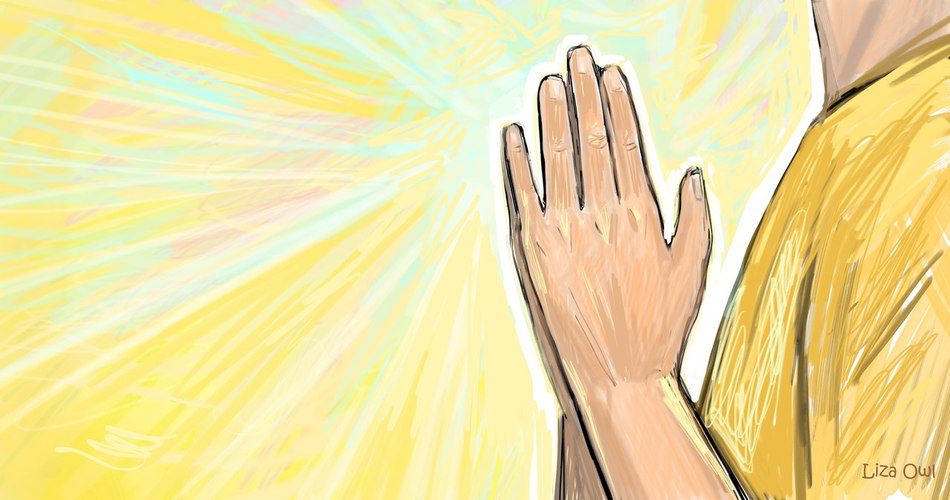We have selected questions and answers on prayer techniques. All of them came to our website from listeners of Oleg Gennadievich’s lectures. We hope that this selection will clarify controversial issues for you and help in your spiritual practice. You can read about how to pray correctly in our article.
Question 1: Please tell me why during prayer sometimes you really want to cry?
Answer: This is normal. When we pray and realize that the Lord hears us, and even more so if we internally feel the answer, then emotions come (gratitude, admiration), which manifest themselves just like tears.
The scriptures say that if while chanting the names of God and saying prayer, we do not experience emotions, tears do not flow from our eyes, then this means that our heart is chained with iron. Therefore, you are lucky that you experience emotions when communicating with God. We can only rejoice at this.
A sincere person, even if he experiences strong emotions, does not show it in public, because these are hidden things. You should be glad that it exists, but you don’t need to show it. Also, there is no need to be proud of this, because this is not our merit, but God’s.
But if a person begins to be proud of it, then this can lead to the fact that he will look down on those who do not have it, and God will not like it. Pride never pleases God. It can cause our relationship with God to not be as deep and those tears will go away. Be very careful about this.
Question 2: During prayer, I often yawn. Please tell me what am I doing wrong?
Answer: You are doing everything right. Books that describe the practice of yoga describe this phenomenon. When a person engages in spiritual practice, he encounters certain obstacles that manifest themselves in different ways. One of the obstacles on the spiritual path is the mode of ignorance, and it manifests itself in the fact that a person yawns. There is nothing strange about this. This will gradually pass as you continue to engage in spiritual practice.
Question 3: Is it possible to pray silently? Are there situations when you want to pray, but it’s uncomfortable to do it out loud?
Answer: Of course you can. After all, prayer is the recognition of one’s dependence on God and the expression of this recognition in words or thoughts. You can do this out loud because it makes it easier to concentrate. But if circumstances do not allow, the same can be done inside, and there will be the same effect.
If we expand on this topic, we can note the following. It’s good when our prayer consists of several blocks. In the first part, a person usually glorifies God and speaks of His greatness. Then he thanks God for what He does for him. After this, the person talks about his position and dependence on God, and only at the end asks.
A request is an element of recognizing one’s dependence on God. You should always ask, but you can ask for different things. The ideal option is when a person always adds at the end of the prayer: “Lord, fulfill this request if it does not interfere with my spiritual development.”
Question 4: I really like to walk to work. On average, the journey takes one hour. On the way I read all the prayers I know. Question: Do prayers read on the go have power?
Answer: It is wonderful that you are looking for every opportunity to engage in spiritual practice. You don’t waste time and, just going to work, you think about how to spend this time on spiritual development. This is very good. The Lord certainly appreciates your sincerity and efforts. These prayers certainly have power. He hears them and will definitely answer them.
I think one of the answers to your prayers will be that you will have more opportunities so that you can pray more in better conditions. Because when we walk, it is not always possible to concentrate on prayer. Lots of distractions. It is clear that we may not have any other time, and we are trying to use the opportunities that we have.
In response to your sincerity, you will be able to immerse yourself in prayer more. For example, there will be free time when you can sit in front of the altar and calmly concentrate on prayer. If you have such an opportunity, then you should definitely take advantage of it. The effect of such prayer will be many times greater, because you will be able to immerse yourself in it more thoroughly.
Question 5: How to pray correctly for a person, because during prayer I concentrate on a holy person?
Answer: When we pray, we should glorify God. Concentrating on a holy man means that we concentrate on how he teaches how to pray to God. It's not just imagining a picture of a holy man, although that's not a bad thing. But a deeper understanding is to meditate on the teaching and mood of a holy man, and in that mood turn to God.
Therefore, in Vedic culture, a person turns to both God and a holy person (spiritual teacher). Because the spiritual teacher carries the consciousness in which one must turn to God. When we pray to God under the direction of a spiritual mentor, we need to meditate on how he prays and do it in the same mood. But when we have finished our prayer, after that we can ask for the blessing of the Lord to help the person for whom we want good.
If we ask for material benefits for this person, then at the end we must say: “Lord, I trust in You. If You think it will be beneficial for a given person, let it happen. If this somehow harms this person, destroys his spiritual progress, then You yourself decide what will be best for him.” It is very beneficial if we leave the decision to the Lord. This ensures that everything will work out for the best.
Question 6: Please tell me how to perform prayer if the work involves only night shifts? Disorder in the daily routine.
Answer: You can pray at any time and in any conditions, if you wish. We always have the opportunity to immerse ourselves in prayer, turn to the Lord and read the prayers of holy people. Prayer does not have to be done only in the morning. This can be done at any time.
Of course, it’s good when you have the opportunity to pray in the morning, because this is the most favorable. But this does not mean that you cannot do this at other times of the day. You can always pray, and night shifts cannot be an obstacle to this.
I noticed that when a person begins his spiritual practice and sincerely tries to do it in the conditions in which he currently finds himself, then gradually he has more opportunities for practice.
However, some people always say that they do not have the opportunity to pray, that they cannot do it, and that they are constantly missing something to engage in spiritual life. Others gratefully accept the opportunities they have and do what they can. As a result, the Lord gives them even more opportunities for intensive spiritual practice.
Question 7: How to pray correctly? Is it possible to mix prayers from different religious traditions and the phrase “I wish everyone happiness”? Will this replace prayer?
Answer: The phrase “I wish everyone happiness” does not replace prayer. I don’t know whether it’s possible to mix prayers from different spiritual traditions. I don't mix. But you pray as best you can. The time will come, and some spiritual tradition will appeal to you more, and you will be in it. Until that time comes, there is no need to be sad, you need to live as you live. I also had the same time: I liked one tradition and the other. I chose one and my friend was also between these two and chose the other. And we're both happy. He is in his spiritual tradition, I am in mine.
You will understand that when you receive faith in your heart, you will not have problems with choice. And if you have not yet received faith in your heart, there is no need to worry either. You need to go to spiritual programs, study everything, the time will come and you will receive it. You don't have to worry about anything. Worry is a sign of irrationality. You just have to live the life you have. The Vedas explain that there are two functions of the mind: choice and doubt. When a person has not yet chosen faith, it is better to question and study everything. But when the choice comes, you feel it in your heart, which means that doubts must be ended. We must follow this path and endure.
Question 8: Can I, as a holy person, pray to the Mother of God? I am Orthodox, she is close to me, and I always pray to her. After all, she is higher than all the angels and saints. Isn't this the same as praying to God?
Answer: The main object of worship of all believers is God. One form of worshiping God is prayer. What is prayer? Prayer is the recognition of one's subordinate position and the manifestation of this recognition through words.
Then the question arises: what about prayers to the saints? They are not God. A believer turns to God, recognizing himself as His servant, and turns to the saints, including the Mother of God, in order to learn how to correctly turn to God.
Sometimes people refer to saints incorrectly. They turn to them as a kind of power parallel to God. That is, there is a God who needs to be addressed, and there are saints who also need to be addressed regarding some specific problems, and they will help. But this is not a very correct approach.
Although the Vedic scriptures say that if a person wants to achieve success in spiritual life, he must approach both God and a holy person. But the purpose of turning to a saint is to learn how to properly turn to God.
If a person directly turns to God, then he does so within the framework of his understanding. But if he turns to God, learning from those who know more about it, then his worship and prayer will be more powerful and the result will be more powerful. Therefore, you can pray to the saints about how to learn how to turn to God correctly.
If you turn to the Mother of God so that she will guide you on the true path, so that she will help you practice devotion to God, then this is a very good and correct prayer. To answer your question, can you, as a holy person, pray to Our Lady, yes, you can do so.
Также хорошо, если в вашем окружении будут те, кто живут сейчас и идут по стопам святых прошлого, стараются жить по их наставлениям и уже преуспели в этом. Если у вас есть возможность видеть таких людей, слушать их, то такое общение позволит вам быстрее получить благо и научиться правильной молитве Богу.





